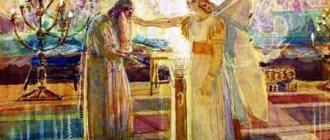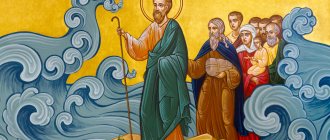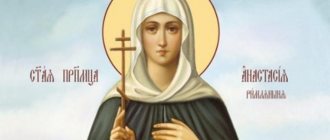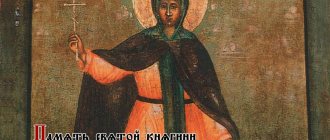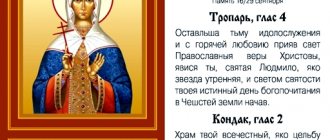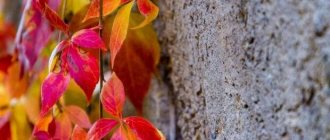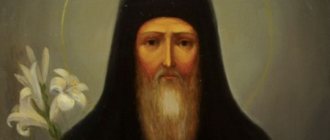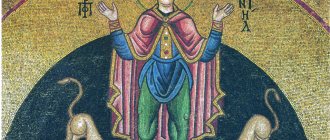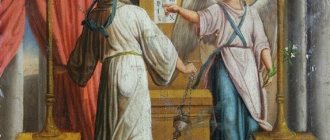The great prophet who became the representative of God on earth, the man through whom the Almighty created a new people - the Jews. The author of the first five books in the Bible, born into a simple family and who became the leader of an entire multi-million people, is Moses.
The Holy Prophet Moses is a monumental figure in the history of the Jewish people, born of a simple Jewish woman, raised by the prince of Egypt, chosen by God to lead the Jews from slavery to the Promised Land, who handed over to people from the Creator the tablets with the 10 commandments.
Birth and youth of Moses
The life of the prophet is a vivid example of the rise and fall of the human personality, patience and obedience, rebellion and submission. 3a the four centuries that passed after the death of Joseph, the ruler of Egypt, who took his brothers and father, their families and assistants, from a small family grew a whole people, consisting of several million and belonging to 12 tribes, the ancestors of which were the children of Jacob, Joseph's father .
In four hundred years, the healthy Jews turned into slaves of the Egyptians; they multiplied quickly, which caused concern among the Egyptian pharaoh. Amram and Jochebed, a family from the tribe of Levi, already had a son, Aaron, and a daughter, Miriam, when the decree was issued to kill all newborn boys.
Having given birth to another son, Jochebed hid him for 3 months, but when the threat became clear, she took a basket, tarred it and put the boy in it, letting the Nile flow. At this time, the daughter of Pharaoh was walking along the river bank, heard the cry of the baby, saved him and took him to the palace to raise Moses as an Egyptian son.
Pharaoh's daughter finds Moses in the river
Mariam saw her brother’s rescue; she quickly thought of offering her mother as a nurse for the rescued boy. Growing up in the royal chambers, the young man gained wisdom by listening to the stories of his nurse, without even suspecting that this was his own mother.
Read about the prophets:
- Prophet Jeremiah
- Prophet Ezekiel
- Life of the Holy Prophet Isaiah
Flight into the desert and the calling of Moses by God
Moses was 40 years old when he learned the truth about his origins and began to protect the Jews from cruel treatment. At some point, without calculating his strength, the once prince of Egypt pushed the Egyptian, he fell and died.
Frightened of punishment, the future prophet runs away into the desert and ends up in the house of Raguel, who was a priest and had a daughter, Zipporah, who soon became the fugitive’s wife.
He herded cattle for 40 years, gained wisdom, growing in maturity, until one day he saw a burning bush in the desert. The shepherd was surprised by the fact that the dry bush was burning and did not burn out. He approached the fire and heard the voice of God.
Important! The thorn bush or the Burning Bush became the first signs of Epiphany in the life of the Old Testament prophet. (Exodus 3:5-7)
Few people believe that the burning bush, a symbol of the suffering and perseverance of the Jewish people, has survived to this day in the monastery of St. Catherine in Sinai. The Creator ordered the prophet to take off his shoes, for he was standing on holy ground, and to come up to hear the command to lead the Jewish people out of captivity.
In response to the question of who the stranger was speaking to, the Almighty answered: “I am who I am” (Exodus 3:12). For skeptics, I would like to emphasize that these events in the Pentateuch are described by their participant himself, Moses.
Moses and the burning bush
God shows the future saint His power through miracles, turning the rod into a snake, and covers the healthy hand of the chosen prophet with leprosy and at the same moment heals it.
Moses humbly accepts God's command to become the head of the Jewish people; through the miracles revealed, he understands that the Almighty is always nearby. Even tongue-tiedness did not become an obstacle to God’s conduct. The older brother Aaron became God's mouthpiece.
From the darkness of Sinai to the light of Tabor
The time of the earthly life of the god-seer has come to an end. The people of Israel needed unshakable faith and a young leader with such faith. Such a leader was the faithful disciple of Moses, Joshua, who led his people into Canaan.
Before his death, Moses, at the command of the Lord, ascended Mount Abarim and from there cast a farewell glance at the land of Canaan. The great righteous man died there. According to legend, he was 120 years old.
Moses did not enter the Promised Land, but he entered the Kingdom of Heaven. On Mount Tabor we will again see the great righteous man next to the Lord Jesus Christ - at the moment when He reveals to the disciples the radiance of His glory.
Newspaper "Orthodox Faith" No. 18 (566)
The Ten Plagues and the Exodus of Moses from Egypt
The saint who came to Pharaoh, who had previously lived in this palace for forty years, boldly ordered the release of all the Jews from captivity. For Egypt it was a disaster; releasing all the slaves was tantamount to stopping life.
The ruler of Egypt did not react to the miracles that were revealed, his priests could do the same, he tightened the working conditions for slaves.
Then 10 plagues were revealed. The Lord, seeing the disobedience of the fans of paganism, sends new tests.
- The next morning, the Creator ordered the brothers to go to the Nile River, sacred according to Egyptian law, and hit it with a rod. As soon as the rod touched the water surface, all the water in the river, reservoirs, and jugs of the Egyptians turned into blood. Pharaoh promises to release the Jews, but as soon as the water becomes clear again, he forgets about his decision.
Prophet Moses asks Pharaoh to let his people go - A week later, Aaron, by the will of the Lord, stretched out his hand to the Nile, and frogs covered all the surfaces of Egypt. They were in houses, beds, on tables, in every corner. Pharaoh prayed to beg God to stop the punishment, again promising to free the slaves, and again did not fulfill the promise.
- The third plague was the invasion of midges, which covered the earth in clouds.
- For midges, God sends dog flies, whose bites are especially painful. The miracle of this execution was that the Creator punished the Egyptians without the participation of Aaron, saving the houses of the Jews from dog flies. Pharaoh's heart softens, he promises to do the will of God and asks to pray for him, and again becomes hardened.
- During the fifth plague, all Egyptian livestock died from a pestilence; the domestic animals of the Jews remained alive.
- To carry out the sixth plague, the Almighty ordered the chosen prophet to take ashes in his hand and throw them, scattering them in the wind. At the same moment, the bodies of the Egyptian people and their animals were covered with purulent boils. The Lord showed executions and forgiveness, showing His power to punish and have mercy.
- The next execution was hail, accompanied by lightning strikes. Vineyards and trees were destroyed by hail, lightning killed livestock, but the disaster did not touch the land of Goshen, where the Jews lived. Pharaoh's repentance did not last long; his heart became cruel again.
- Even Pharaoh did not expect such a punishment. As soon as Moses extended the rod over the earth, locusts appeared with a wind of enormous force, destroying all the greenery in their path. Egypt is a scorched desert, but Ramses remains adamant.
- The ninth plague was expressed in the fact that thick darkness covered the earth, proving that the Egyptian sun god Ra was just an idol devoid of power. Three days later, Pharaoh yielded, but not for long, the Jewish people groaned from his cruelty.
- The Lord's patience was exhausted. He orders the Jews to celebrate the first Passover in their history, to slaughter the lambs, and anoint the doorposts with their blood. The blood of the lambs became a sign the next night for the angel of death, coming to take the souls of the Egyptian firstborn.
The next morning, Egypt drowned in the cries of Egyptian mothers; this cup and the Pharaoh's palace did not pass. Coming out with his dead son in his arms, Ramses ordered the Jews to be released.
Important! In ten plagues, the Almighty Creator revealed His power and glory; Easter, liberation from slavery, became the main Jewish holiday for all centuries.
short biography
Moses is the most famous of the Old Testament prophets, through whom God communicated with the Jews, as God's chosen people. The estimated period of life is 1500-1300 BC.
Origin
Moses was born in Egypt. His parents, Amram and Jochebed, were from the tribe of Levi. Like all Levites, the father was a priest and did not have land or livestock. The Jewish people, who had once voluntarily moved to Egypt and had significant benefits, by this time had been reduced to the status of slaves. Pharaoh, in order to limit the birth rate of the Jews, ordered the killing of newborn boys.
Moses' mother hid the child for 3 months, but was forced to put him in a basket and let him float down the Nile. A basket with a crying baby washed ashore in the place where the Pharaoh's daughter was bathing. She told the maids to get the baby. The name given to the child means “taken from water.”
Childhood and youth
Moses' older sister, Miriam, was nearby, watching to see who would see and take the basket containing the child. She invited the Pharaoh's daughter to find a nurse, to which she agreed. The child returned to his home, where no one could hurt him now.
When Moses was 2 years old, he was brought to the daughter of the ruler of Egypt, who made him her adopted son. Moses received a good education, having mastered the knowledge available to the Egyptians.
Life
Until the age of 40, he lived under the pharaoh, watching how his fellow tribesmen were oppressed. An incident of mistreatment of a Jewish overseer caused him to intervene and kill the Egyptian. Fleeing from punishment, Moses fled to the land of Midian, where he was sheltered by the local priest Raguel. Soon Moses married his daughter Zipporah.
thorn bush
40 years passed in the land of the Midianites. One day, Moses was tending sheep in the desert and saw fire on the sacred Mount Horeb. An irresistible force forced him to rise up. The sight of a thorn bush burning without heat, but not burning, horrified him. Moses heard a voice commanding him to take off his shoes and not approach the fire. Frightened Moses took off his shoes and covered his face with his hands. A voice from the thorn bush told him that he was the God of the descendants of Adam from his son Jacob and his name was Jehovah (Jehovah).
The Burning Bush became a symbol of the Holy Church: fire meant the suffering of the Jews, in the crucible of which it was purified, and a prototype of the Incarnation. God, who appeared to the shepherd, said that the groans of the Jews had reached him, and Moses’ duty was to save the people of Israel. The timid Moses humbly said that he was weak and tongue-tied, but he heard in response that God would always be with him and would put convincing speeches in his mouth.
As proof, God showed two miracles: he turned the staff into a snake, and leprosy appeared and disappeared on his hand. Thus, he gave Moses power over the Jewish people and endowed him with the ability to perform miracles. Jehovah assigned his elder brother Aaron to help Moses.
10 plagues
To fulfill the Lord's order, Aaron and Moses came to Pharaoh and, in the name of God, demanded that the Jews be released into the desert to perform holiday rituals. But Pharaoh did not recognize the faith of the Israelites and refused. To prove the power of the Lord, Aaron threw his rod on the ground, and it turned into a snake. The Egyptian priests did the same, and their rods were transformed into reptiles. But Aaron's rod swallowed up the rods of the Gentiles. Pharaoh did not heed the Lord's warning, and the Egyptians experienced the power of God's wrath.
Ten plagues were brought down by Jehovah on the people of Egypt before Pharaoh made concessions. First execution. Aaron struck the water of the Nile with his staff in front of the ruler and turned all the water in Egypt into blood. Only the Jews could take water from the river, and the Egyptians were forced to buy it from them. But Pharaoh was angry because he considered it witchcraft.
After 7 days, Aaron stretched out his hand and the earth was covered with frogs. Pharaoh began to ask Moses to beg God for deliverance from the frogs. Moses fulfilled his request, and the Lord cleansed the land. Pharaoh did not let the Jews go. Third execution. Aaron struck with his staff, and the Egyptians and their cattle were attacked by mosquitoes. Pharaoh did not take this as God's punishment, despite the beliefs of the priests.
The Lord told Moses to tell Pharaoh that if he did not fulfill his command, then the Egyptians would be attacked by dog flies. And so it happened. The entire land of Egypt suffered from the invasion of fierce insects, except for the area where the Jews lived. The frightened ruler agreed to release the Jews and promised to make a sacrifice to God, but after getting rid of the flies he again did not fulfill his promise.
God carried out the fifth plague without the mediation of Moses and Aaron, unleashing a pestilence on the Egyptian livestock. Moses threw a handful of ashes over himself. The wind blew away the dust particles, and all the Egyptians and cattle were covered with boils. But the Lord hardened the ruler’s heart so that he would feel the heavenly punishment even more strongly. God told Pharaoh that tomorrow he would send hail and lightning such as the land of Egypt had never seen. Moses was the doer of punishment. All the fields and gardens of the Egyptians were destroyed by hail, the terrible peals of thunder resembled the voice of God. The lands where Jews lived were not affected. Pharaoh repented and prayed to the Lord. But God did not want him to let the Jews go out of fear and hardened him.
The eighth plague was an invasion of locusts, which was brought by the east wind after the direction of Moses' rod. Pharaoh was ready to repent again, but God sent hatred into his heart so that the Egyptians would remember the disasters that befell them until the end of time. Moses raised his hands, and a night fell on Egypt, lasting 3 days. In vain the priests appealed to the god Ra, darkness swallowed up the country of the pagans. Pharaoh agreed to release the Jews if they did not take their flocks, but Moses disagreed, declaring that the next punishment would be even worse.
The month of Abib has arrived (from mid-March to mid-April). The Jews were preparing for the exodus. God commanded them to slaughter a lamb on the 14th day of Abib and anoint the doors of their houses with its blood. On the night of the 15th, God sent the Angel of Death to the land of Egypt. He killed all the firstborn of people and livestock, passing by Jewish dwellings marked with the blood of the lamb.
Establishment of Easter holiday
From that time on, the Jews began to celebrate the day of the slaughter of the lamb as a holiday, calling it Pesach (Easter), which means “to avoid something.” On this day they do not eat yeast bread, but prepare unleavened bread (unleavened bread).
The Old Testament tradition has a symbolic meaning.
The blood of the lamb anticipates the blood shed by Christ on the Cross for the sins of people. The Lamb of God (Jesus Christ) with his death atoned for the original sin of Adam, protecting the human race from the wrath of the Lord.
Refusal to eat traditional yeast dough means that the people of Israel did not accept pagan traditions. A simple and quick recipe for preparing unleavened dough testifies to the power of God, with what speed he freed the people from oppression. Easter tradition also requires that the lamb be served whole, without the head removed.
Exodus
Frightened by God's Providence, Pharaoh called Moses and Aaron and ordered them to lead the Jews out of Egypt. Before the start of the journey, the Lord commanded to baptize all the saved firstborns, from people to livestock. He decreed that the firstborn should be sanctified and given over to the service of God.
On the last night, the Jews celebrated Passover, took all their property, livestock, bones of the patriarchs, and more than two million people left Egypt. God determined the path to the promised land for the Jews. Day and night he moved in front of the column in the form of a pillar of fire. Pharaoh saw that his country was impoverished without the hardworking Hebrew slaves, and, forgetting about the punishments of the Lord, he gathered an army and set off after them.
Crossing the sea
Imminent death or return to Egypt threatened the Israelites: ahead was the sea, behind were the warriors of Pharaoh. The Lord commanded Moses to strike the water with his rod. A strong east wind blew, the sea parted, revealing the bottom. The Jews walked along the ground, between blocks of water frozen on both sides. When they had crossed half the sea, Pharaoh's army appeared on the shore. The ruler, without hesitation, gave the order to follow the Israeli column. Chariots with soldiers raced along the bottom of the Red Sea, but did not have time to catch up with the Jews. Finding himself on the shore, Moses struck the water with his rod again. The sea waves closed, leaving their pursuers in the abyss.
Miracles that Moses performs
Jews spent 430 years in Egypt, entering the country in the number of 75 people; 1500 BC a people numbering about 3 million came out. It is difficult to imagine such a mass of people, with carts, animals, tents, in need of food and water, moving through the desert.
Read about the Bible and the Old Testament:
- History of the Bible
- How does the New Testament differ from the Old?
- Names of God and their meaning in the Bible
Pharaoh saw the devastated lands, became angry again and ordered the slaves to be returned. But the Lord ordered the prophet to lead the people to the Red Sea, to the place where two canals connect, and as soon as the Jewish leader struck the water, the sea parted, forming a passage to the other side.
The passage of the Jews along the bottom of the Red Sea
One can only guess about the width of this passage, but it was quite large, because the 3 million people managed to cross to the other side before the arrival of the Egyptian chariots.
As soon as the last Jew crossed the Red Sea, the depths of the sea covered the passage, dragging along the Egyptians who were chasing the fugitives (Exodus, chapter 14).
And a song of gratitude was born to God for salvation and his guidance in difficult moments of life.
I sing to the Lord, for He is highly exalted; he threw his horse and rider into the sea. The Lord is my strength and my glory, He was my salvation. He is my God, and I will glorify Him; God of my father, and I will exalt Him (Ex. 15: 1-2).
3 million people were in the desert where water was a major problem. The water in the sea was salty. Three days later, a murmur began, and the prophet, with the hands of God, performed a new miracle; at the command of the Creator, he threw a tree into the sea, after which the water became sweet.
Every day manna from heaven covered the earth, providing daily food that was sufficient for everyone.
On a note! Manna became the prototype of the Eucharist, for only food from God can satisfy our souls, grant salvation and life.
While crossing the desert, the Creator said that he would stand on a mountain, on which the future saint would only need to hit with a rod for water to flow. (Exodus 17:6). All the people and livestock received water.
The Amalekites attacked the Jews, but the Almighty again showed a miracle through the prophet, ordering him not to stand at the head of the warring forces, but to climb the mountain and keep his hands raised up. Obedience and patience guided the leader of the Jewish people. When he lowered his hands, the Amalekites won, he raised them, and victory returned to the Jews. Faithful companions came to the rescue and held the hands of the prophet.
Moses with his hands raised is the first type of the cross.
The Lord ordered the prophet to write down everything that happened, which is further confirmation that Moses is the author of the Torah or Pentateuch in the Bible.
Procession through the abyss
We are all very familiar with the words of the irmos of the first song of the Penitential Canon to our Lord Jesus Christ - “As Israel walked on dry land, and saw the persecutor Pharaoh drowned in the abyss.”
They recall the miraculous events that accompanied the flight of the Israelites from the servants of Pharaoh. Moses led his people to Canaan not by the shortest route - through the area of the modern Suez Canal. The shortest route was blocked by the troops of the Syrians who rebelled against Egypt. The pharaoh, having recovered from the blow that befell him, but without drawing obvious conclusions, set out to chase the fugitives. However, on the side of the Jews was the Lord Himself, Who dwelt in their camp in the form of a pillar of fire and cloud. It is not surprising that the Israelis were able to easily overcome seemingly insurmountable obstacles. Their path was crossed by a chain of reservoirs called the Sea of Reeds (in Russian translation - the Red Sea, in Church Slavonic - the Red Sea). There was no way to go around it, but at the command of God, the water parted before the Israelites, forming two walls of water - to the left and to the right of the fugitives. Pharaoh's reckless servants, in the heat of pursuit, rushed after them, and the water closed over their heads. To lead the Jews out of Egyptian captivity, the Lord worked miracles. They are visible evidence that God is ever present with His people. The passage of the Jews through the Red Sea also had a symbolic meaning: it is a prototype of the New Testament baptism and the miraculous birth of the Lord Jesus Christ from the Virgin Mary.
Sinai Covenant and 10 Commandments
The procession approached Mount Sinai, and the Creator ordered, through the prophet, all the people to wash their clothes and wait for His appearance in cleanliness.
On the third day, rolling thunder and enormous force of lightning arose at the top of the mountain; in the thick cloud covering the mountain, the sound of trumpets could be heard, which became increasingly louder. In trepidation and fear, people watched the vibrations of Mount Sinai, realizing that the Lord himself was in front of them.
Prophet Moses receiving the Tablets of the Covenant from the Lord
The Almighty Himself appeared before the people chosen by Him, the people created by Him, to bestow a law, the implementation of which would be a guarantee of God’s protection. (Exodus 20:2-7)
Moses, who ascended the mountain, was given two tablets on which the Ten Commandments were written by the hand of God. In the fullness of the Ten Commandments, both divine and human laws are given, failure to comply with which is punishable by the Lord and people to this day.
Read about the Commandments:
- Commandment: “Honor your father and mother”
- Commandment "Thou shalt not steal"
- Commandment: “Thou shalt not take the name of the Lord in vain”
At the border of the Promised Land
The road to Canaan was long and dangerous. And now the desired land is already within sight. But what is there, in this mysterious country? What peoples inhabit it? Moses sends twelve spies to the land of Canaan, among whom the Bible names Joshua, his most faithful servant. Returning, they report that the area is beautiful and that it is inhabited by powerful warriors. The Jews do not believe that the Lord will help conquer it, and decide to return to Egypt. Only Joshua and Caleb continue to believe in the promise of the Lord. Unbelief once again leads the people of Israel to revolt, but the Lord once again heeds the plea of the meek Moses and grants forgiveness to “stiff-necked” Israel. However, the punishment must be fulfilled: none of the Jews who left Egypt over the age of seven, with the exception of Caleb and Joshua, will enter the Promised Land. It will be open only to those who have not had the experience of slavery.
The Wrath of Moses
It is difficult to believe that the people, who saw the lightning and the rocking of the mountain, who heard the sound of the trumpet, could not withstand forty days while the holy prophet was before God's presence on the mountain.
People who grew up among the worship of idols began to demand the making of a golden calf in order to worship it, and to ask it for the salvation of the people.
How often do modern Christians forget about the mercy of Jesus Christ, the Savior, and in difficult moments they run to fortune-tellers and psychics.
Moses, descending from the mountain after forty days, sees the golden idol and breaks the tablets in anger.
Worship of the Golden Calf
God cannot be mocked, idolaters were punished, many people perished, but the Creator gives new tablets to His faithful children, restoring His covenant. The Almighty forgives the Jews and again calls Moses to Himself.
After forty days spent on the mountain in fasting and prayers before the great Creator, he descends from the mountain with the tablets, covering his face, for the light emanating from him literally blinded people with its radiance.
Construction and Consecration of the Tabernacle
The Lord spoke to Moses while traveling through the desert, commanding him to build a place of worship for Him. The Almighty gave a clear plan for the structure of the tabernacle or camp temple, in which there was an altar, and the Holy of Holies, where the tablets were kept in the ark.
The Lord showed His presence by covering the tabernacle with a thick cloud. The cloud lifted a year later, signaling to the Jewish people that they should move forward.
The people refused to believe in the success of the exit, many recalled sitting around the fires with meat stews, the Creator sending them quails falling from the sky, so many that the birds lay in a meter-thick layer. Before those who grumbled had time to swallow the meat, they were struck by ulcers.
Sister Mariam and Aaron were jealous of their brother and were looking for an opportunity to accuse him of something. They began to condemn their brother for marrying the Midianite Zipporah and demanded that power be transferred to Aaron. The Lord came to the defense of the chosen saint, saying from the cloud that He was communicating with the Jewish leader “mouth to mouth.”
Old Testament Tabernacle
Because of her grumbling, the Almighty struck Miriam with leprosy, and forgave Aaron, for he repented. The loving brother prayed for Mariam, she was healed, but lived outside the camp for seven days.
